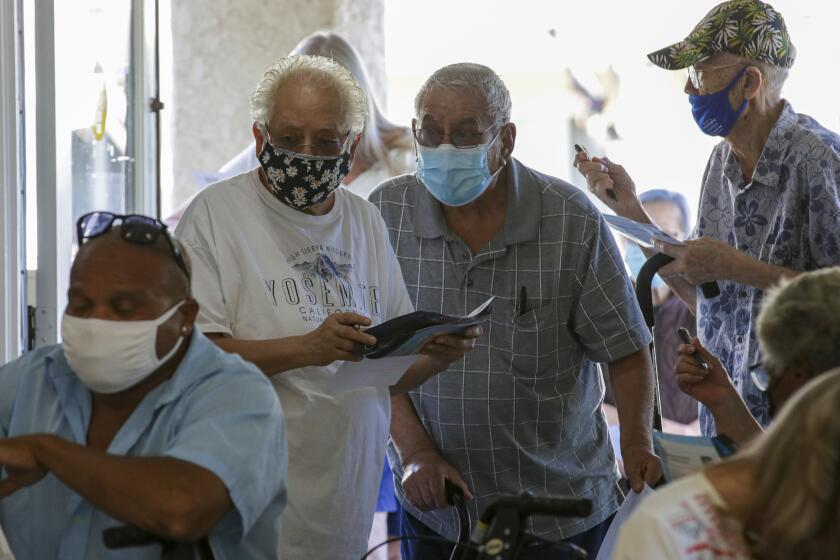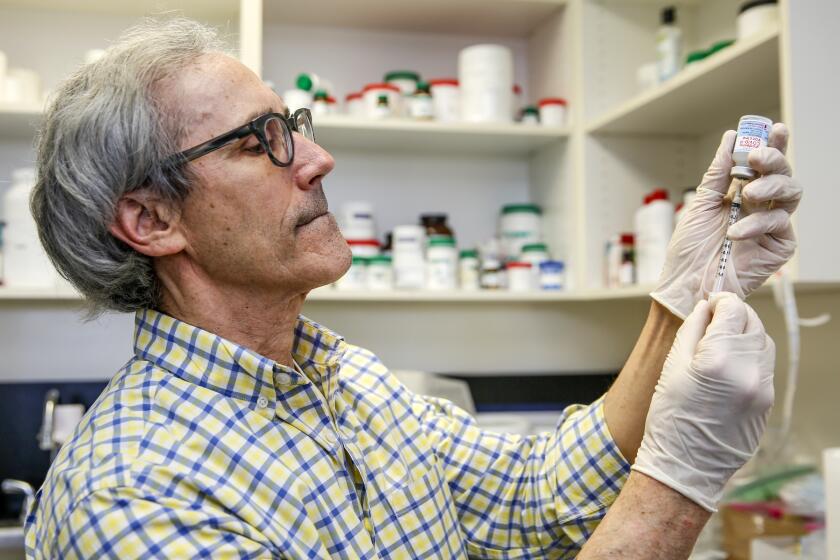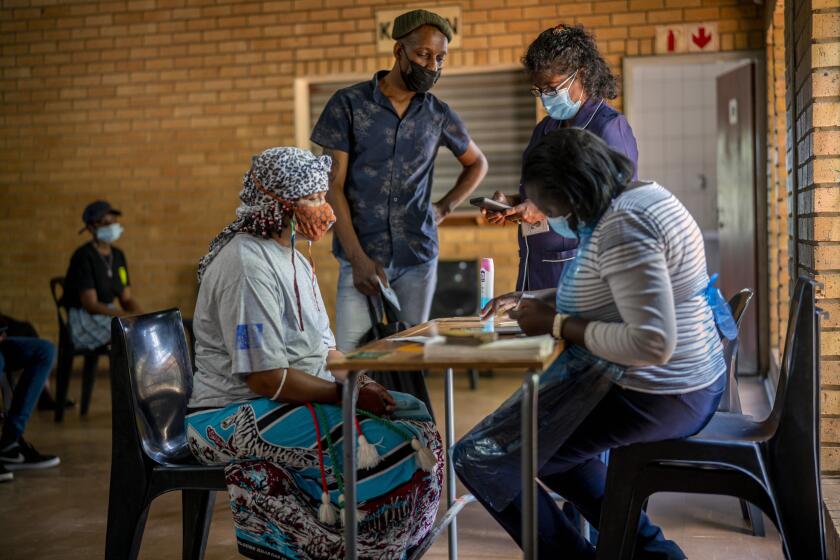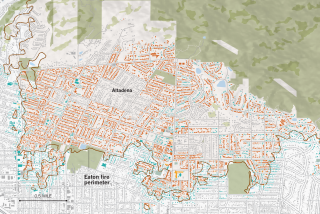One woman helped move the needle on Black vaccination in South L.A. She’s ‘Mama Tsega’
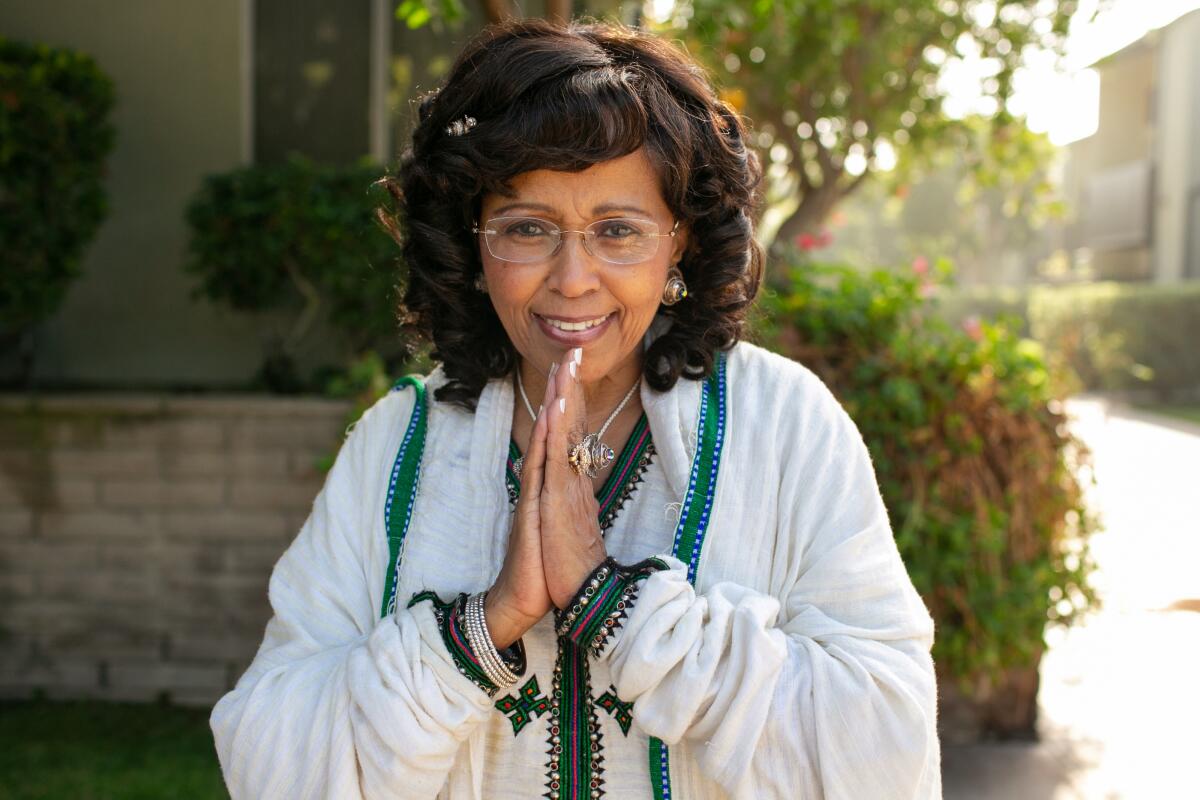
- Share via
Tsega Habte was so determined to recruit people to her first COVID-19 vaccination clinic that she put her personal cellphone number on the event flier.
When the day finally arrived, she seemed in constant motion, bouncing from station to station, attending to volunteers, answering phone calls from strangers about the clinic targeting the East African community, switching effortlessly between English, Amharic and Tigrinya.
She was like the White Rabbit in “Alice’s Adventures in Wonderland” — but on time and minus the dithering — at the March event at Kedren Community Health Center in South Los Angeles. Habte would appear in one place, in her crisp white lab coat and with her large purse on her shoulder, then suddenly reappear in another.
One minute, she was sitting with an Eritrean elder. The next, she was helping arrange a plate of bagels for volunteers and participants. Blink and you’d miss Habte taking photos with Dr. Jerry P. Abraham, Kedren’s director of vaccines, or sitting with the recently vaccinated to be sure none suffered side effects.
“Are you feeling OK, honey?” she’d ask in her unique accent, a mix of the five tongues she’s mastered. Once certain each person was fine, she’d disappear off to her next stop.
Vaccination rates are up, but there’s fear Black and Latino men will continue waiting until they almost die from COVID-19 or watch people they know die before getting vaccinated.
Habte might be considered a busybody in any other context, a meddler too interested in the lives of others. But she meddles for good. The Eritrean immigrant, pharmacist and concerned community member channels her curiosity and frenetic energy into things that matter, like global pandemics. It makes her not just an organizer but an especially effective one.
Nine months and three successful clinics later, Habte’s partnership with Kedren has produced a model for vaccination outreach: targeted pop-up clinics hosted in familiar spaces and promoted and staffed by familiar faces using culturally relevant methods. She’s aided in the vaccination of thousands and is lionized at Kedren, where she’s called “Mama Tsega.”
“You need to do it because you want to do it,” Habte said about her organizing. “If you want to do it because you have a hidden agenda — because you have some way to benefit or whatever — then it might be very difficult. For me, it is my nature.”
That’s the secret to her success.
::
At a meeting at her “office,” her neighborhood Starbucks in Culver City, Habte wore a lilac Calvin Klein sweatsuit with a faint purple leopard print. Her still-thick hair was styled in big curls. She had a stack of bangle bracelets on one wrist and a gold watch on the other. Her nails looked freshly painted with an iridescent pink polish that matched her sparkly pink eyeshadow.
“I have only 30 minutes,” the ever-busy Habte said as she took a seat and began laying out her life story.
Her age is a closely guarded secret — “I’ll never tell” — but the highlights of her life provide clues, not only about her age but about her tenacity and resilience.
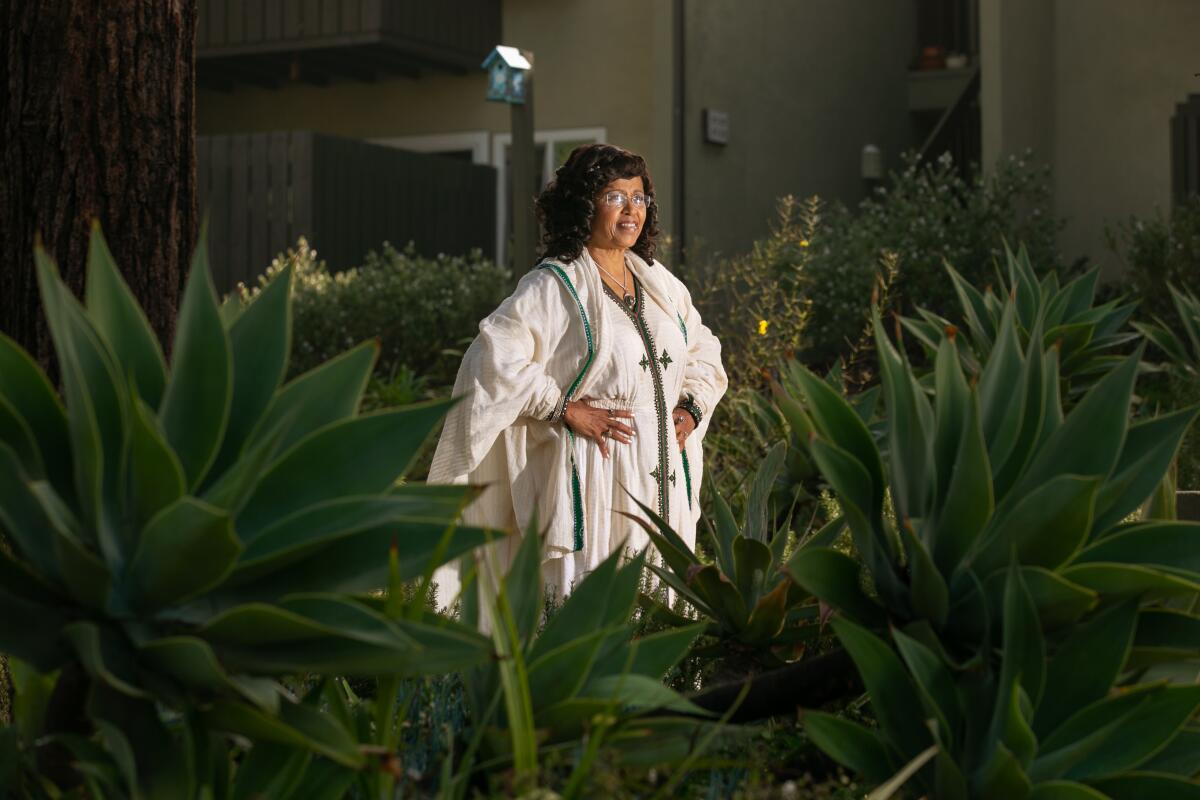
She was born in Eritrea. An Italian colony before falling under British administration, the East African nation finally secured independence in 1991 after a 30-year war with neighboring Ethiopia.
Habte grew up one of five children in the capital, Asmara, in the shadow of conflict. In those years, Eritrea was still defining itself, and her father encouraged her early on to take part in nation-building.
“My father’s dream was for me to become somebody, to be educated. I was overprotected in the house. I was not to do house chores, but to study all the time,” Habte said.
Her studies began in an Italian school where she demonstrated a knack for learning languages and a passion for math and science. Her ability to galvanize people was also apparent when, in eighth grade, Habte organized a community service project at her Girl Scouts chapter.
Federal health officials aren’t giving any specific recommendations, but there are options for COVID-19 boosters, and it’s OK if you mix vaccines.
“The city is so beautiful,” she said of Asmara. “The buildings are some of the most amazing buildings in the world. Old, untouched architecture. So all these Girl Scouts together — all the Girl Scouts in Asmara — I organized them to clean.”
Habte later became one of three girls to attend what was historically an all-boys technical high school. Upon graduation, she won a scholarship from the United Nations to study pharmacy in Romania.
“Eritrea was under Ethiopia at that time and the new president of Ethiopia had allies in Europe, including the Soviet Union and other countries like Romania and Yugoslavia. They created programs for students to study and scholarships. I chose Romania because the language was similar to Italian, which I already spoke,” Habte explained.
She studied there for seven years before graduating with a master’s degree. By then, her homeland was still at war.
“My father said to continue to go live in other places until our country is peaceful, until our country is independent,” Habte said.
::
Some people’s lives become smaller, more insular, in a new country. Habte was determined to make hers bigger.
She arrived in Los Angeles in 1983 and moved in with an aunt in Culver City, already home to an Eritrean community center and restaurant on Washington Boulevard. Subsequent years brought refugees from Eritrea and Ethiopia to L.A. and surrounding areas, especially Mid-Wilshire and Inglewood.
She found community among the growing East African population, but also with Black Americans, including staffers at Martin Luther King Jr./Drew Medical Center, where she began her career as a clinical researcher, and Charles R. Drew University of Medicine and Science, where she was on the faculty for family medicine and later a manager of the OB/GYN department. She also became an active member at First African Methodist Episcopal Church, the oldest Black church in Los Angeles.
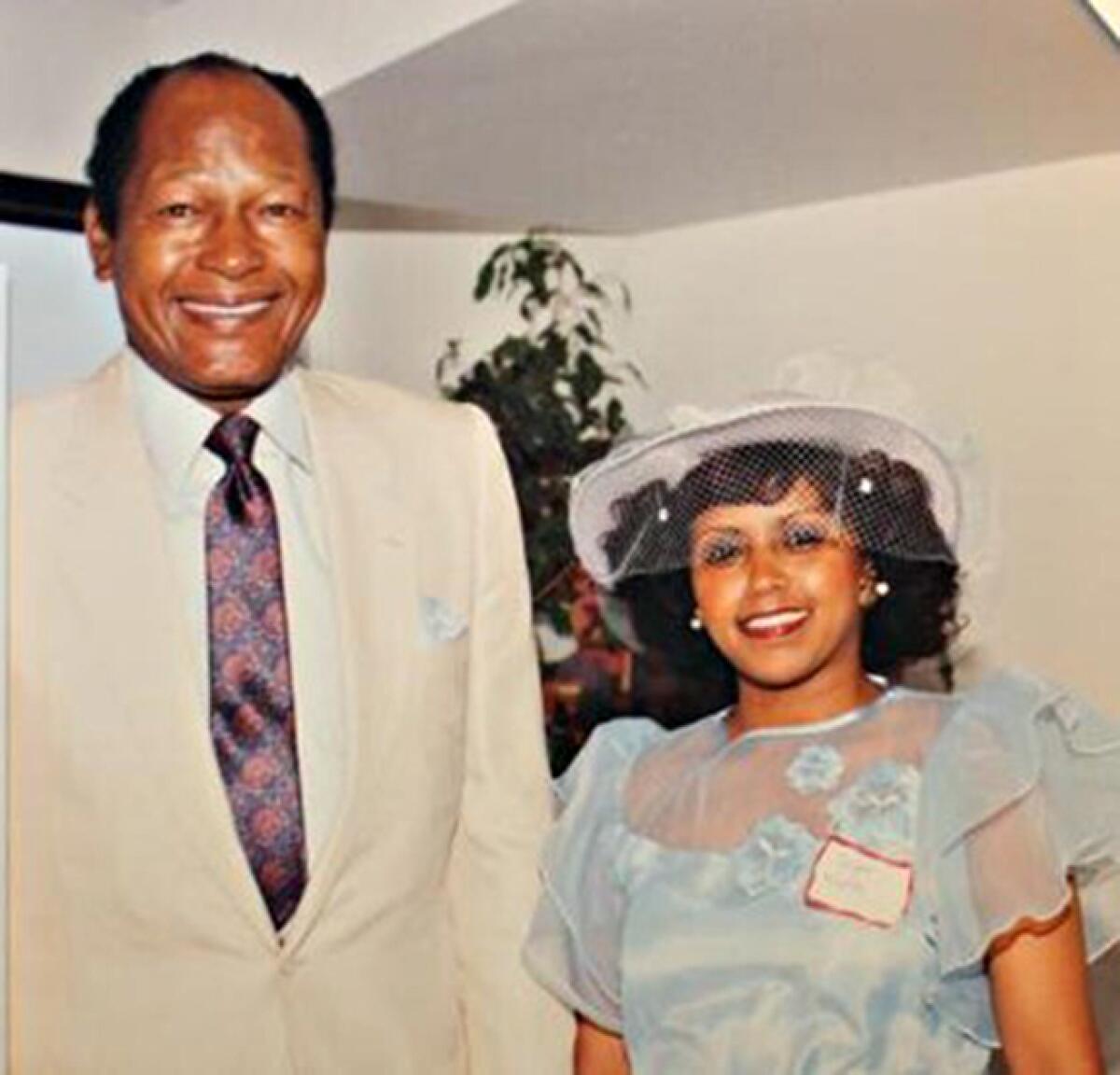
When the Olympics came to L.A. in 1984, Habte thought, “Let me help Romania and pay them back” and volunteered to translate for the Romania delegation. That led to a pivotal meeting when then-Mayor Tom Bradley swung by to meet the interpreters.
“He came to an event to congratulate us and to say thank you. Then he sees me sitting in front with the Romanians — Afro, little Eritrean African woman. He thought I was sitting there by mistake,” Habte said with a smile.
Bradley tried to help her find the right section till she explained Romanian was one of her five languages.
“I told him all of the story and he was fascinated,” she said. “I started to help him as a volunteer on his campaign and in his fundraising and helping to introduce him to the African immigrant community.”
“He became like my uncle,” she adds, “and I became a niece.”
Friends and colleagues say that her relationship with Bradley illustrates Habte’s superpower: She’s a master at relationship-building. She’s more familiar with WhatsApp than TikTok, more comfortable speaking with someone IRL than in a DM. All she needs is one shared interest, one degree of connection to bond with someone. From there, they’re family.
In people who got a booster shot, levels of neutralizing antibodies exceeded the peak that followed two doses of COVID-19 vaccine.
“She told me that I reminded her of her people. She said, ‘You’re like my cousin,’” said Capri Maddox, executive director of the Los Angeles Civil + Human Rights and Equity Department.
The two met when Maddox first visited First AME Church 20 years ago. When Maddox was appointed to run the department last year to address systemic racism and bias in Los Angeles, Habte was there to help.
Like the time when Maddox’s office launched its “LA for ALL” campaign, plastering the city with anti-hate posters and banners, and Habte made sure materials were also printed in Amharic and Tigrinya.
“We didn’t have a translator to do that work, so Tsega said, ‘I’m going to provide translations and then you guys are going to pay to have the posters made,’” Maddox said. “She met us halfway so there was no reason not to do it.”
::
In April 2020, the Ministry of Health in Eritrea formed a COVID-19 task force to coordinate relief efforts for Eritreans affected across the globe. The ministry tapped local Eritrean professionals, including Habte, to be point people in L.A.
Their initial focus was on providing personal protective equipment, or PPE, and directing resources to individuals grappling with unemployment, but Habte’s priorities shifted once the vaccines started to roll out last December.
A key opportunity came in March when Collin Hinds, another community leader, invited Habte and the task force to a meeting at Kedren Community Health Center.
Kedren was administering as many as 3,000 shots every day, but Abraham, the hospital’s director of vaccines, believed it could do more to reach Black Los Angeles. He’d organized the meeting to brainstorm solutions.
South African scientists are warning that the new Omicron variant may be causing more reinfections among COVID-19 survivors than earlier virus mutants.
“We brought together a coalition of community leaders and faith leaders to talk about how we were going to increase vaccination rates,” Abraham recalled. “I asked, ‘What are we going to do?’”
Most guests were reserved. But one he didn’t recognize was brimming with enthusiasm: a petite, smartly dressed older woman who’d made sure to secure a seat beside Abraham.
When it was finally her turn to speak, Habte announced solemnly in a small, raspy voice that she was at Abraham’s service.
“I said, ‘Dr. Abraham, I am here dedicated to make sure Eritreans, Ethiopians, and all other Black and brown people get vaccinated,’” she recalled.
The doctor didn’t know what to make of the woman but was bowled over by her earnestness.
“She just stepped up,” Abraham said.
“When Tsega says yes, nobody can say no. That’s pretty much it.”
— Carmen Hayward-Stetson on her friend, Tsega Habte
Habte locked in a commitment from Abraham to host a clinic at Kedren targeting L.A.’s East African community. Then she put her formidable contact list — people she knew from her time working with Mayor Bradley — to work.
She and Ethiopian community partners secured volunteers to staff the event and translate. They brought traditional food too. Last but not least, Habte partnered with Civil + Human Rights and Equity Department to supply face masks, water and hand sanitizer. Habte also brought her twin, 20-year-old daughters along to staff events.
Meseret and Merhawit Mehzun are juniors at the University of San Francisco and following their mom’s footsteps into public service. Meseret, who goes by Mercy, is studying communications and is pursuing a career in community health. Merhawit, who goes by Merha, is majoring in international studies and hopes to work in sustainable development.
What resulted was a community experience.
“I always like to feed people. You know, you can’t organize events and not feed people. Give them coffee, tea, water and food,” said Habte. “That’s how I got the name Mama Tsega. People saw the event and said, ‘You organize like a mother.’”
Next, in April, she brought Kedren’s mobile clinic to First AME, the South L.A. church where she’s been a member for 37 years. The site was strategic. Habte has long worked to bridge gaps between the East African community in Los Angeles and the larger Black community.
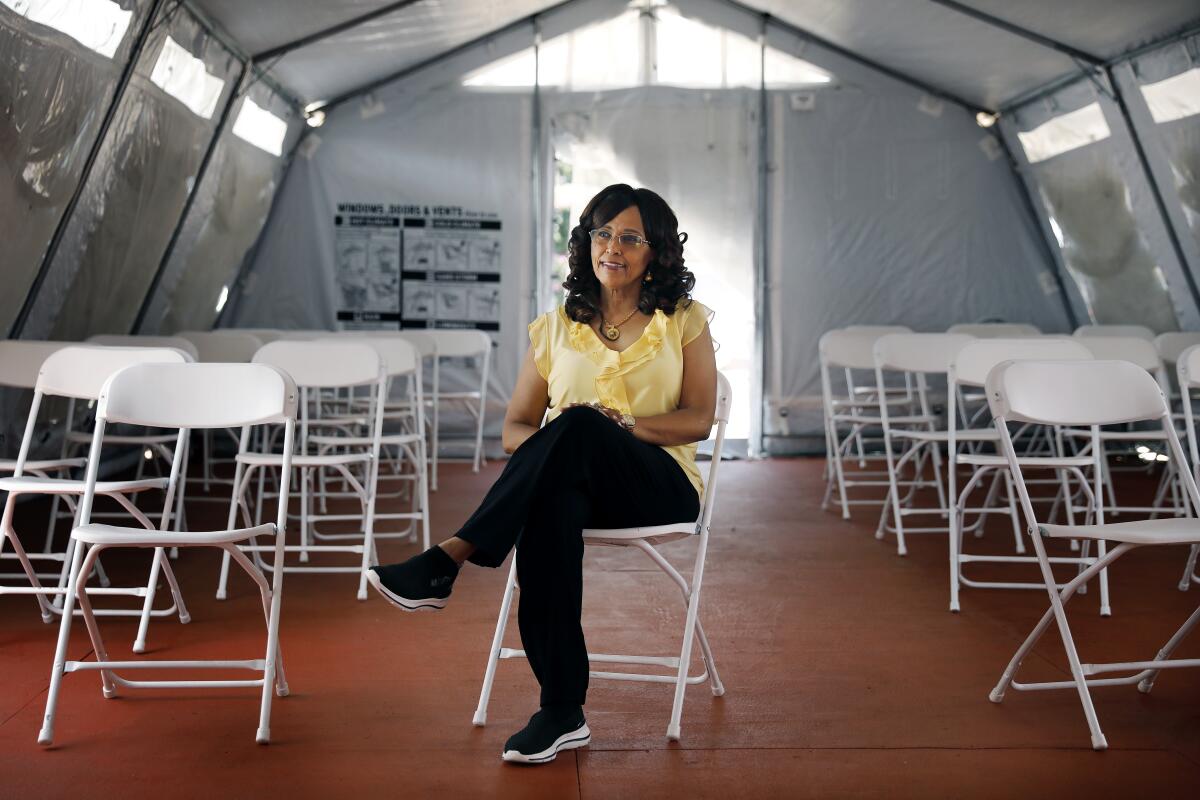
She then partnered with the African Communities Public Health Coalition to plan a clinic in May for the West African immigrant community.
In total, the events Habte helped organize with Kedren provided vaccinations for more than 3,000 people.
“Altogether, it’s probably more, to be honest,” said Abraham, who describes Habte as a “gateway to the mayor’s office and other city departments.”
Habte’s clinics have mostly served Black people, among them non-English speakers, those on limited incomes or older people without much access to technology. They’re groups that public health campaigns have a hard time reaching, but Habte sees reaching them as just another challenge to be met.
“When Tsega says ‘yes,’ nobody can say ‘no.’ That’s pretty much it,” said Carmen Hayward-Stetson, one of Habte’s closest friends, and a fellow community organizer. “When it comes to approaching people about whatever it is that she’s trying to accomplish, she thinks ‘no’ means ‘not yet.’”
Habte is now thinking about how to extend her reach even more. Her latest project is a talk show on YouTube, co-hosted by Bini Zerai, a local hydrogeologist.
The English language show, called “Appetizer,” covers community issues, including COVID-19 news. It’s named for its mission, which is to “stimulate viewers’ appetite for conversation.”
The show is low-fi and a little stilted — you can tell Habte is still mastering the teleprompter —but that somehow adds to the program’s authenticity and charm. And the show’s first guest was another reminder of her connections — Mayor Eric Garcetti, who began his appearance with kind words about Habte.
“First of all, Tsega, thank you for everything that you do and everything that you are,” Garcetti said. “You are a real angel in the City of Angels and, just as you’ve demonstrated down at Kedron, your work saves lives.”
She met Garcetti years ago when he made a campaign stop at First AME Church. The two struck up a conversation about East Africa and have stayed in touch ever since.
“So easy, likable,” Habte said of their relationship, “He’s like a brother for me.”
More to Read
Sign up for Essential California
The most important California stories and recommendations in your inbox every morning.
You may occasionally receive promotional content from the Los Angeles Times.

